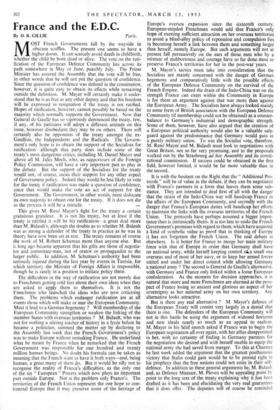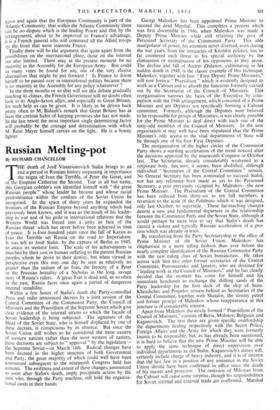France and the E.D.C.
OST French Governments fall by the wayside in obscure scuffles. The present one seems to have a higher doom. It can scarcely avoid death in childbirth, whether the child be born dead or alive. The vote on the rati- fication of the European Defence Community lies across its path somewhere in May or June, possibly July. The Prime Minister has assured the Assembly that the vote will be free, in other words that he will not put the question of confidence. Since the question of confidence was defined in the constitution, however, it is quite easy to obtain its effects while remaining outside the definition. M. Mayer will certainly make it under- stood that he is as free as any other deputy and that his freedom will be expressed in -resignation if the treaty is not ratified. Hopes of ratification, however, cannot possibly be based on the majority which normally supports the Government. Now that General de Gaulle has so vigorously denounced the treaty, few, if any, of his partisans will adopt a different attitude on this issue, however disobedient they may be on others. There will certainly also be opponents of the treaty amongst the ex- Gaullists, the Independents and the Radicals. The Govern- ment's only hope is to obtain the support of the Socialists for ratification—although that party does include some of the - treaty's most dangerous critics, including M. Daniel Mayer and above all M. Jules Moch, who, as rapporteurs of the Foreign Policy Commission, will have a very important part to play in the debate. But the support of the Socialists for the treaty would not, of course, mean their support for any other aspect of Government policy. Indeed they would be less likely to vote for the treaty if ratification was made a question of confidence, since that would make the vote an act of support for the Government. The Government, in other words, must dislocate its own majority to obtain one for the treaty. If it does not die in the process it will be a miracle. • This gives M. Rene Mayer's fight for the treaty a certain gratuitous grandeur. It is not his treaty, but at least if the treaty is ratified it will be his ratification—a great deal more than M. Bidault's, although the doubts as to whether M. Bidault was as strong a defender of the treaty in practice as he was in theory have now been set at rest. The treaty remains of course the work of M. Robert Schuman more than anyone else. But it long ago became apparent that his gifts are those of negotia- tor and committee-man, not of orator or propagandist to the larger public. In addition, M. Schuman's authority had been seriously injured during the last year by events in Tunisia, for which territory the Minister of Foreign Affairs is responsible, though he is rarely in a position to initiate policy there.
The difficulties in the way of ratification are not merely due to Frenchmen getting cold feet about their own ideas when they are asked to apply them to themselves. It is not the Frenchmen who launched the ideas who are now criticising them. The problems which endanger ratification are at all events those which will make or mar the European Community. Must it lead to a German hegemony ? Will membership of the European Community strengthen or weaken the linking of the member States with overseas territories ? M. Bidault, who was not for nothing a stirring teacher of history in a lye& before he became a politician, summed the matter up by declaring to the Assembly last week that the French Government's policy was to make Europe without unmaking France. He underlined what he meant by France when he remarked that the French Government was responsible for one hundred and twenty million human beings. No doubt his formula can be taken as meaning that the French want to have it both ways—and, being human, a great many of them do. But it would be silly not recognise the reality of France's difficulties, as the only one of the six " European " Powers.which now plays an important part outside Europe. Nor is the problem only France's. The territories of the French Union represent the one hope to con- tinental Europe that it may preserve some of the heritage of Europe's oversea expansion since the sixteenth century. European-minded Frenchmen would add that France's only hope of exerting sufficient attraction on her overseas territories to avoid a blind-alley policy of repression and compulsion lies in becoming herself a link between them and something larger than herself, namely Europe. But such arguments will not at present fall persuasively on the ears of those men who by a mixture of stubbornness and courage have so far done most to preserve France's territories for her in the post-war years.
M. Mayer's tactics must take into consideration that the Socialists are mainly concerned with the danger of German hegemony and comparatively little with the possible effects of the European Defence Community on the survival of the French Empire. Indeed the drain of the Indo-China war on the strength France can exert within the Community in Europe is for them an argument against that war more than against the European Army. The Socialists have always looked mainly to some form of British association with the European Defence Community (if membership could not be obtained) as a counter- balance to Germany's industrial and demographic strength. Some of them, however, have also argued that the creation of a European political authority would also be a valuable safe- guard against the predominance that Germany would gain in a purely military union. To win the Socialist vote, therefore, M. Rene Mayer and M. Bidault must look to negotiations with Great Britain, not so far very promising, and to the proposals worked out by the Strasbourg ad hoc Assembly and its consti- tutional commission. If success could be obtained in the first field, however limited, it would be far more valuable than in the second.
It is with the hesitant on the Right that the "Additional Pro- tocols" will be of vake in the debate, if they can be negotiated with France's partners in a form that leaves them some sub- stance. They are intended to deal first of all with the danger that the strain of the Indo-China war will handicap France in the affairs of the European Community, and secondly with the danger that France's European duties will handicap her efforts to maintain the links with the overseas territories of the French Union. The protocols have perhaps assumed a bigger impor- tance than is intrinsically theirs. It is too late to undo the French Government's promises with regard to them, which have acquired a kind of symbolic value as proof that in thinking of Europe it has not forgotten the French Union. The real debate is elsewhere. Is it better for France to merge her main military force with that of Europe in order that Germany shall have no national army, while herself keeping control of, a small one overseas and of most of her navy, or to keep her armed forces united and under her direct control while allowing Germany a national army ? The second is General de Gaulle's alternative, with Germany and France only linked within a loose European confederation. As the moment for decision approaches, it is natural that more and more Frenchmen are alarmed at the pros- pect of France losing so ancient and glorious an aspect of her sovereignty as her national army on her own territory. Any alternative looks attractive.
But is there any real alternative ? M. Mayer's defence of the European Treaty will consist very largely in a denial that there is one. The defenders of the European Community will not in this battle be using the argument of widened horizons and new ideals nearly so much as an appeal to realism.
M. Mayer in his Setif speech asked if France was to begin the European negotiation all over again, with her allies disappointed in her, with no certainty of finding in Germany partners for the negotiation she desired and with herself unable to equip the national army she had saved from merger. To this at Chartres he last week added the argument that the greatest posthumous victory that Stalin could gain would be to 'be proved right in his prophecy that the free nations could not unite in their self- defence. In addition to these general arguments he, M. Bidault and, as Defence Minister, M. Pleven will be appealing point by point to the long text of the treaty explaining why it has been drafted as it has been and elucidating the very real guarantees that it does offer. The deputies will of course be reminded vain and again that the European Community is part of the Atlantic Community, that within the Atlantic Community there can be no dispute which is the leading Power and that by the arrangements, about to be improved to France's advantage, it is a French general who will command all the Allied troops on the front that most interests France.
Finally there will be the argument that quite apart from the possibilities on the international plane, those on the internal are also limited. There may at the present moment be no majority in the Assembly for the European Army. But could as many votes be found for any one of the very elusive alternatives that might be put forward ? Is France to doom herself to be passed over in international politics because there is no majority in the Assembly for any policy whatsoever ?
In the three months or so that will see this debate gradually reaching its climax, the French Government will no doubt often look to its Anglo-Saxon allies, and especially to Great Britain, for such help as can be given. It is likely to be driven back pretty often to M. Bidault's remark that Great Britain has at least the curious habit of keeping promises she has not made. In the last resort the most important single determining factor will probably be the courage and determination with which M. Rene Mayer himself carries on the fight. He is a bonny fighter.



































 Previous page
Previous page